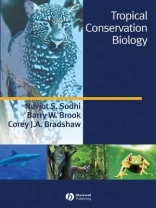This introductory textbook examines diminishing terrestrial and
aquatic habitats in the tropics, covering a broad range of topics
including the fate of the coral reefs; the impact of agriculture,
urbanization, and logging on habitat depletion; and the effects of
fire on plants and animal survival.
* * Includes case studies and interviews with prominent
conservation scientists to help situate key concepts in a real
world context
* Covers a broad range of topics including: the fate of the coral
reefs; the impact of agriculture, urbanization, and logging on
habitat depletion; and the effects of fire on plants and animal
survival
* Highlights conservation successes in the region, and emphasizes
the need to integrate social issues, such as human hunger, into a
tangible conservation plan
* Documents the current state of the field as it looks for ways
to predict future outcomes and lessen human impact
‘Sodhi et al. have done a masterful job of compiling a
great deal of literature from around the tropical realm, and they
have laid out the book in a fruitful and straightforward
manner…I plan to use it as a reference and as supplemental
reading for several courses and I would encourage others to do the
same.’ Ecology, 90(4), 2009, pp.
1144-1145
Table des matières
Preface.
Acknowledgements.
1. Diminishing habitats in regions of high biodiversity.
2. Invaluable losses.
3. Broken homes: tropical biotas in fragmented landscapes.
4. Burning down the house.
5. Alien invaders.
6. Human uses and abuses of tropical biodiversity.
7. Threats in three dimensions: tropical aquaticconservation.
8. Climate change: feeling the tropical heat.
9. Lost without a trace: the tropical extinction crisis.
10. Lights at the end of the tunnel: conservation options andchallenges.
References.
Index
A propos de l’auteur
Navjot S. Sodhi is Professor at the National University of
Singapore. An associate/subject editor of Conservation Biology, the
Auk, and Biotropica, Navjot received his Ph D from the University of
Saskatchewan, Canada. A recipient of National Geographic Society
grants, he has also spent time as a Bullard Fellow at Harvard
University, where he holds an adjunct associate position.
Barry W. Brook is Professor and Director of the Research
Institute for Climate Change and Sustainability at the University
of Adelaide, Australia. His research interests include climate
change, global ecology and extinction dynamics. Barry serves on the
editorial boards of Ecological Research and Raffles Bulletin of
Zoology and is a member of the Australian Research Council College
of Experts and F1000 Biology. In 2006 he was awarded the Fenner
Medal by the Australian Academy of Sciences.
Corey J. A. Bradshaw is Associate Professor and Principal
Research Fellow at Charles Darwin University, Australia. He earned
a doctoral degree from the University of Otago, New Zealand and has
extensively researched marine and terrestrial vertebrate
populations, with an emphasis on extinction modelling and
ecological theory. Corey is an Associate Editor for Journal of
Animal Ecology.












